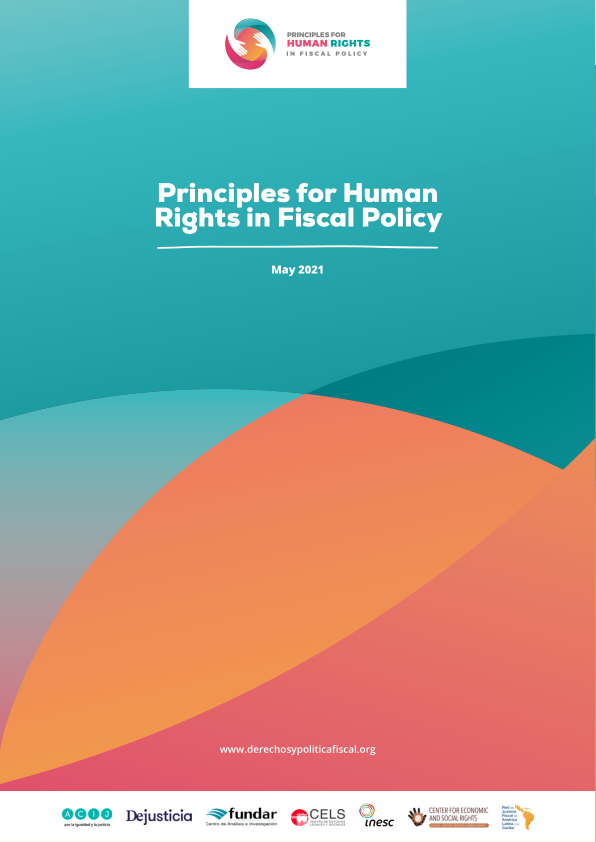
Principles for Human Rights in Fiscal Policy
The Principles for Human Rights in Fiscal Policy are a ground-breaking normative tool that distills the key human rights principles applicable to tax and budget policies and translates them into more concrete guidelines for the design, implementation, and assessment of fiscal policies. Based on a rigorous analysis of different legal and normative sources, they provide a clear, specific framework that can strengthen the accountability of governments, and help States to establish prioritization criteria in the distribution of resources. In turn, this could help strengthen the redistributive potential and efficiency of fiscal policy, provide alternatives to the imposition of fiscal austerity policies, and prevent social crises resulting from cuts in public resources.

The Principles are the product of a collective effort led over several years by eminent human rights and fiscal policy experts from Latin America, and steered by a group of civil society organizations (CESR among them) who came together to form the Initiative for Human Rights Principles in Fiscal Policy.
The content of the Principles was also informed by a series of dialogues and consultations with different groups and social movements (including Indigenous and afro-descendant groups, feminist movements, and trade unions) in the countries of the region.
When people demand more investment in public services, living wages, safer housing or more comprehensive social protection, it is very common to hear governments respond that: “we simply can’t afford it”. Similarly, refrains such as “austerity is the only option”, or “we need to cut costs and balance budgets” are a constant chorus.
However, these economic dogmas have failed to deliver their supposed benefits, while successive global crises –including the COVID-19 pandemic– have exacerbated inequality, increased poverty and called conventional economic wisdoms even further into question. People around the world are more vocally decrying the fact that fiscal policies have been formulated without considering people’s real needs, and without paying attention to human rights commitments which are designed to protect dignity and ensure greater equality.
The problems stemming from the disregard of human rights in fiscal decisions are especially serious in Latin America and the Caribbean. The region is characterized by gaping inequalities, recurrent economic crises that have been used to justify severe austerity measures, the under-regulated exploitation of natural resources to the detriment of people and planet, stubbornly high poverty rates and widespread corruption.
The Principles aim to fill an important gap, bringing human rights standards and principles into discussions and decisions about fiscal policy in a concrete and tangible way. The Principles show that there are more progressive alternatives to mobilize resources, but moreover they show that there are binding rules requiring fiscal policies to be made from the perspectives of equality, accountability and justice, putting human rights at the center.
The development and dissemination of the Principles is part of a broader convergence of human rights and fiscal justice movements in Latin America. A groundswell of different actors are seeking out new ways of collaboration and coordination that enables a more profound challenge to the narratives and actions of economic elites and other powerful actors. With their basis in human rights law, the Principles can be a powerful tool to advocate for transformational fiscal measures that are needed to avoid massive breaches of rights – such as taxes on wealth and so-called excess profits; correcting gender and other biases in tax systems; strengthening social protection systems and basic income programs; eliminating unjust and unnecessary fiscal privileges; and combating tax evasion, avoidance and fraud.
In addition to highlighting the potential that fiscal policy has for the realization of human rights, this project aims to encourage the use and implementation of The Principles by regional, national and local actors.
The Initiative for Human Rights Principles in Fiscal Policy is led by a Steering Committee and a Committee of Experts.
The Steering Committee (SC) is composed of a group of organizations and networks with extensive experience in the fields of human rights and tax justice in Latin America and the Caribbean. The organizations provide expertise on issues of financial transparency, budget analysis, combating illicit financial flows, development financing, gender equality and monitoring human rights, among other things. The Steering Committee includes:
- Centro de Estudios de Derecho, Justicia y Sociedad, Dejusticia - Colombia
- Asociación Civil por la Igualdad y la Justicia, ACIJ - Argentina
- Centro de Estudios Legales y Sociales, CELS - Argentina
- Center for Economic and Social Rights, CESR - International
- Fundar, Centro de Análisis e Investigación - México
- Instituto de Estudos Socioeconômicos (INESC) - Brasil
- Red de Justicia Fiscal de América Latina y el Caribe, RJFALyC - Latin America & the Caribbean
As part of the SC and as the Secretariat of the Initiative, CESR exercises overall coordination of the project and carries out the core operational, communications and dissemination tasks.
The Committee of Experts brings together people from different disciplines and countries in the region recognized for their expertise and authority in the fields of fiscal policy, financial and tax law, human rights, constitutional law and other relevant disciplines. The Committee is responsible for the adoption of the Principles and Guidelines, after a process led by the Drafting Committee sub-group, who compiled the document based on an extensive review of existing legal and normative sources.